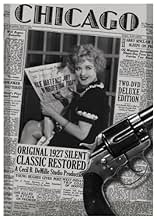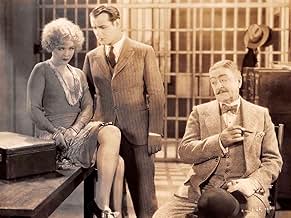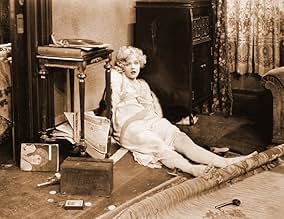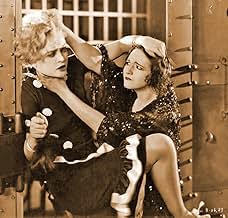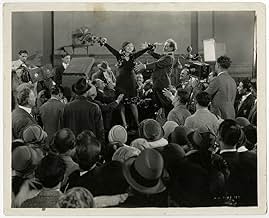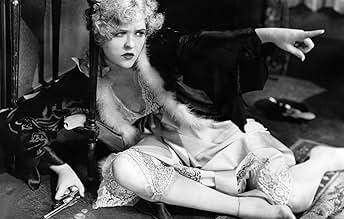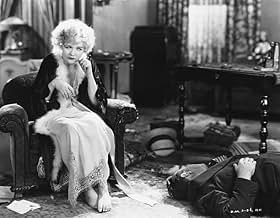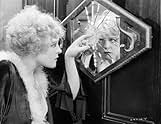Komödie über Sensationsjournalismus und Showbusineß. Roxie Hart einen Mann erschießt und, überrascht von dem einsetzenden Presserummel, lernt, den Mordfall geschickt zu nutzen, um auf die Ti... Alles lesenKomödie über Sensationsjournalismus und Showbusineß. Roxie Hart einen Mann erschießt und, überrascht von dem einsetzenden Presserummel, lernt, den Mordfall geschickt zu nutzen, um auf die Titelseiten der Boulevardpresse zu gelangen.Komödie über Sensationsjournalismus und Showbusineß. Roxie Hart einen Mann erschießt und, überrascht von dem einsetzenden Presserummel, lernt, den Mordfall geschickt zu nutzen, um auf die Titelseiten der Boulevardpresse zu gelangen.
- Regie
- Drehbuch
- Hauptbesetzung
- Auszeichnungen
- 2 wins total
Emily Barrye
- Woman in Cell Reading Book
- (Nicht genannt)
Sidney Bracey
- Bill Collector
- (Nicht genannt)
Robert Brower
- Juror
- (Nicht genannt)
Sidney D'Albrook
- Photographer
- (Nicht genannt)
Jack Dean
- Assistant Prosecutor
- (Nicht genannt)
Robert Dudley
- Insurance Agent
- (Nicht genannt)
Jim Farley
- Detective
- (Nicht genannt)
Empfohlene Bewertungen
Chicago in the mid 20's of the last century.
In this modern Amerikan city reside the Hart's, a young married couple, who adapt to the spirit of the big city. Herr Amos Hart works in a tobacco store and Frau Roxie Hart does absolute nothing but to be unfaithful to her husband with an old man. The old-timer accommodates her whims although this is coming nearly to an end. So when Frau Roxie hears this news; she, who is a bad, bad girl ( besides a peroxide blonde with no brains ... excuse this Herr Graf for such obvious remark ) kills her lover in her apartment.
Desperate over what she has done, she calls for help to her husband telling him that the old man tried to get advantage of her. Herr Hart who is a good man but not stupid at all, discovers what really happened in there. But his love for Roxie is so important to him that he decides to help her by taking the services of a famous, greedy and unscrupulous advocate ( excuse again this Herr Graf for such an obvious remark ); this in order to defend his wife from the death penalty. However, such favour has an expensive price – 5.000 grand that obviously Herr Hart doesn't have.
During a visit to his greedy advocate, he finds out where he hides a lot of money in his bureau and during the night steals the money ( an honourable deed indeed, to rob an advocate ). Meanwhile Frau Roxie Hart's famous trial is nearly begun.
"Chicago", a film directed by Herr Frank Urson in the silent year of 1927, was based in a Broadway play which in turn was based on a true story ( occurring in a real city! ). Reminiscences of the original stage play in its primal concept can be seen in the film, when the director uses a few sets ( the Hart's apartment, the jail or the trial court ) in order to develop the story as it were different acts of a play. This is especially during the first part of the film during the dramatic development at the Hart's apartment and at the end of the movie during the trial. However, Herr Urson makes fairly good use of the proper characteristics of the cinema film narrative in "Chicago" by, constructing excellent visual metaphors ( the jury's feet responding Frau Roxie charms, the tabloid paper going down the gutter ). There are also important and sibylline sexual remarks that are present during the whole film (ah, that garter bell belt). And let's not forget the social realism that can be seen in the film ( Chicago daily life or the Hart's apartment ). Especially outstanding is the power of the yellow press in those old days ( and unfortunately in these modern days too ); the sensationalist journals build up stories on innocent celebrities that certainly have few merits. Naturally this happened with the madcap Roxie, a situation depicted in "Chicago" in a raw and effective way.
Another merit of "Chicago" is the combination of comedy and drama in equal terms highlighting Frau Roxie's stupidity, selfishness and easy living in contrast with her self-sacrificing husband who suffers the acts and nonsense of his wife. He's a man who honestly cares about and loves his wife enough to steal and lie for her although this affection and emotion is not returned.
Starring as the couple are two excellent and not well-known actors who handle their roles considerably well. Herr Victor Varconi as Herr Amos Hart is the lovingly and humiliated husband. Frau Phyllis Haver shines and takes all the credit in the picture thanks to her brilliant performance as Roxie Hart, a madcap, simple and selfish modern girl who has no scruples combined with no brains ... who will have a moment of glory as a famous killer thanks to the help of the yellow press ... who will meet her end on the end of a rope a woman who lives her own life caring for no one except the money.
"Chicago" is an excellent silent movie for all those reasons mentioned above by this German count. Don't forget also a modern one added recently featuring a superb musical score compiled by Herr Rodney Sauer and "The Mont Alto Motion Picture Orchestra". They capture the spirit and mood of the roaring twenties of the last century.
And now, if you'll allow me, I must temporarily take my leave because this German Count must to return to the Schloss from the Windy City.
Herr Graf Ferdinand Von Galitzien http://ferdinandvongalitzien.blogspot.com
In this modern Amerikan city reside the Hart's, a young married couple, who adapt to the spirit of the big city. Herr Amos Hart works in a tobacco store and Frau Roxie Hart does absolute nothing but to be unfaithful to her husband with an old man. The old-timer accommodates her whims although this is coming nearly to an end. So when Frau Roxie hears this news; she, who is a bad, bad girl ( besides a peroxide blonde with no brains ... excuse this Herr Graf for such obvious remark ) kills her lover in her apartment.
Desperate over what she has done, she calls for help to her husband telling him that the old man tried to get advantage of her. Herr Hart who is a good man but not stupid at all, discovers what really happened in there. But his love for Roxie is so important to him that he decides to help her by taking the services of a famous, greedy and unscrupulous advocate ( excuse again this Herr Graf for such an obvious remark ); this in order to defend his wife from the death penalty. However, such favour has an expensive price – 5.000 grand that obviously Herr Hart doesn't have.
During a visit to his greedy advocate, he finds out where he hides a lot of money in his bureau and during the night steals the money ( an honourable deed indeed, to rob an advocate ). Meanwhile Frau Roxie Hart's famous trial is nearly begun.
"Chicago", a film directed by Herr Frank Urson in the silent year of 1927, was based in a Broadway play which in turn was based on a true story ( occurring in a real city! ). Reminiscences of the original stage play in its primal concept can be seen in the film, when the director uses a few sets ( the Hart's apartment, the jail or the trial court ) in order to develop the story as it were different acts of a play. This is especially during the first part of the film during the dramatic development at the Hart's apartment and at the end of the movie during the trial. However, Herr Urson makes fairly good use of the proper characteristics of the cinema film narrative in "Chicago" by, constructing excellent visual metaphors ( the jury's feet responding Frau Roxie charms, the tabloid paper going down the gutter ). There are also important and sibylline sexual remarks that are present during the whole film (ah, that garter bell belt). And let's not forget the social realism that can be seen in the film ( Chicago daily life or the Hart's apartment ). Especially outstanding is the power of the yellow press in those old days ( and unfortunately in these modern days too ); the sensationalist journals build up stories on innocent celebrities that certainly have few merits. Naturally this happened with the madcap Roxie, a situation depicted in "Chicago" in a raw and effective way.
Another merit of "Chicago" is the combination of comedy and drama in equal terms highlighting Frau Roxie's stupidity, selfishness and easy living in contrast with her self-sacrificing husband who suffers the acts and nonsense of his wife. He's a man who honestly cares about and loves his wife enough to steal and lie for her although this affection and emotion is not returned.
Starring as the couple are two excellent and not well-known actors who handle their roles considerably well. Herr Victor Varconi as Herr Amos Hart is the lovingly and humiliated husband. Frau Phyllis Haver shines and takes all the credit in the picture thanks to her brilliant performance as Roxie Hart, a madcap, simple and selfish modern girl who has no scruples combined with no brains ... who will have a moment of glory as a famous killer thanks to the help of the yellow press ... who will meet her end on the end of a rope a woman who lives her own life caring for no one except the money.
"Chicago" is an excellent silent movie for all those reasons mentioned above by this German count. Don't forget also a modern one added recently featuring a superb musical score compiled by Herr Rodney Sauer and "The Mont Alto Motion Picture Orchestra". They capture the spirit and mood of the roaring twenties of the last century.
And now, if you'll allow me, I must temporarily take my leave because this German Count must to return to the Schloss from the Windy City.
Herr Graf Ferdinand Von Galitzien http://ferdinandvongalitzien.blogspot.com
I suspect that Mr. Rob Marshall watched this 1927 silent before making his recent screen adaptation of the smash-hit Broadway musical. The non-musical scenes in his version look an awful lot like this exceptional film.
Phyllis Haver provides a marvelously witty and sexy characterization as Roxie Hart, that ultimate gold digger who shoots her lover for jilting her and then becomes a media sensation. Haver puts all sorts of unique touches on the role, and her scenes during the murder trial are small gems of comic acting. The handsome Victor Varconi, looking for all the world like Liam Neeson, has a much larger role as Amos, Roxie's long-suffering husband, than any subsequent version would give that character. He's still a bit of a sap, but he's a much sharper sap than later incarnations would allow. This original version focuses much more on the domestic relationship between these two -- the roles of Billy Flynn and Mama Morton, treated so colorfully in the musical, are much diminished here, and the character of Velma Kelly is absent altogether.
The recent stage revival and movie have blunted the impact of this story's critique on the modern media and the public's responsibility in enabling our media to peddle trash. It's surprising that a film that came out nearly 80 years ago makes the same point just as candidly; one can only imagine how forceful this message must have seemed at the time.
Grade: A
Phyllis Haver provides a marvelously witty and sexy characterization as Roxie Hart, that ultimate gold digger who shoots her lover for jilting her and then becomes a media sensation. Haver puts all sorts of unique touches on the role, and her scenes during the murder trial are small gems of comic acting. The handsome Victor Varconi, looking for all the world like Liam Neeson, has a much larger role as Amos, Roxie's long-suffering husband, than any subsequent version would give that character. He's still a bit of a sap, but he's a much sharper sap than later incarnations would allow. This original version focuses much more on the domestic relationship between these two -- the roles of Billy Flynn and Mama Morton, treated so colorfully in the musical, are much diminished here, and the character of Velma Kelly is absent altogether.
The recent stage revival and movie have blunted the impact of this story's critique on the modern media and the public's responsibility in enabling our media to peddle trash. It's surprising that a film that came out nearly 80 years ago makes the same point just as candidly; one can only imagine how forceful this message must have seemed at the time.
Grade: A
Phyllis Haver plays the sexy but fickle and material-minded wife of shopworker Victor Varconi, who seems a nice but dullish fellow. While at he's at work, Haver invites 'sugar-daddy' Eugene Pallette upstairs, not realizing that he is intending to dump her, owing to her extravagance. When Pallette refuses to cough up anymore cash, she shoots and kills him, leading to a spectacular and amusing trial.
Along the way, we have a wonderful prison scene with inmates being presided over by matron May Robson, a vindictive D. A. splendidly played by Warner Richmond, and a crooked lawyer in the form of Robert Edeson. Further amusement is provided when Varconi has scraped up $2,500 (rather a lot for a chap who works in a tobacco shop) for the defense and has to cough up the same again. He then decides to rob the fellow to get the remainder, finding it is in fact crooked money as well, having been delivered by thug Walter Long in an all-too-brief cameo, before the climactic trial. Oh, and the nice, pretty cleaning lady (Virginia Bradford) has a yen for Varconi...
The direction of CHICAGO is credited to Frank Urson, who was unknown to me, possibly due to his career being cut short by his death the following year. Other notable credits are Peverell Marley, Mitchell Leisen and Leonore Coffee, and the whole thing is very handsomely presented, with a nice score from Rodney Sauer.
Along the way, we have a wonderful prison scene with inmates being presided over by matron May Robson, a vindictive D. A. splendidly played by Warner Richmond, and a crooked lawyer in the form of Robert Edeson. Further amusement is provided when Varconi has scraped up $2,500 (rather a lot for a chap who works in a tobacco shop) for the defense and has to cough up the same again. He then decides to rob the fellow to get the remainder, finding it is in fact crooked money as well, having been delivered by thug Walter Long in an all-too-brief cameo, before the climactic trial. Oh, and the nice, pretty cleaning lady (Virginia Bradford) has a yen for Varconi...
The direction of CHICAGO is credited to Frank Urson, who was unknown to me, possibly due to his career being cut short by his death the following year. Other notable credits are Peverell Marley, Mitchell Leisen and Leonore Coffee, and the whole thing is very handsomely presented, with a nice score from Rodney Sauer.
I really liked this film, viewed from the UCLA print. Phyllis Haver, now all but forgotten, shines as Roxie Hart, a good time girl who despises her husband and seeks sugar daddies for fun. As soon as you see her pretending to sleep, having discarded her garter with bells attached, you know she's trouble.
So Roxie kills, and goes to jail, and because she's blonde and pretty, she's taken up by the media in this wild world of flappers and jazz. Those familiar with the musical film with Renee Zellweger and Catherine Zeta-Jones will be wondering 'where's Velma?' but that character isn't in the forefront at all. This film is all about Roxie, and, more than the musical version, to some extent about her cuckolded husband Amos. Here we see his point of view on several occasions, and even follow him in scenes where Roxie doesn't appear. Victor Varconi puts in a lovely performance as Amos in this film.
Haver might dominate the proceedings, and lights up what is already a fast-moving and effective bit of jazz fluff, but there's a good, if brief performance from Eugene Palette as well. As Casely he is very watchable indeed.
As this was a late silent, the acting styles are mainly naturalistic, and the fact that it does not have sound, only titles, doesn't matter a bit when it comes to following the story. Miss Haver acts her heart out anyway and you can feel her contempt, her fear, her desperation, just as you would if you could hear it.
A superior film, and one which occasionally makes it out for public showings. A great pity it isn't on DVD as it is extremely enjoyable and deserves a wider potential audience.
So Roxie kills, and goes to jail, and because she's blonde and pretty, she's taken up by the media in this wild world of flappers and jazz. Those familiar with the musical film with Renee Zellweger and Catherine Zeta-Jones will be wondering 'where's Velma?' but that character isn't in the forefront at all. This film is all about Roxie, and, more than the musical version, to some extent about her cuckolded husband Amos. Here we see his point of view on several occasions, and even follow him in scenes where Roxie doesn't appear. Victor Varconi puts in a lovely performance as Amos in this film.
Haver might dominate the proceedings, and lights up what is already a fast-moving and effective bit of jazz fluff, but there's a good, if brief performance from Eugene Palette as well. As Casely he is very watchable indeed.
As this was a late silent, the acting styles are mainly naturalistic, and the fact that it does not have sound, only titles, doesn't matter a bit when it comes to following the story. Miss Haver acts her heart out anyway and you can feel her contempt, her fear, her desperation, just as you would if you could hear it.
A superior film, and one which occasionally makes it out for public showings. A great pity it isn't on DVD as it is extremely enjoyable and deserves a wider potential audience.
10tybalt-2
Last night the Sam Goldwyn theatre at the Academy in Los Angeles was filled to capacity for the screening of this 1927 silent movie. The print was a restoration, by UCLA, of the original nitrate copy from the DeMille family's archives. It was a full length version, with a 10 min. intermission. Johnny Crawford's orchestra provided a live musical accompaniment, based on original scoring notes. A standing ovation at the end proves that a really well performed silent movie can stand the test of time. Phyllis Haver had a range of expressions from A to Z - fantastic - and the courtroom scene, played for comedy, was truly a highlight. If a DVD is made, as has been suggested, you're in for a treat.
Wusstest du schon
- WissenswertesAlthough Frank Urson is credited as the director, it was widely known (and even publicized) at the time that producer Cecil B. DeMille directed most of the film (including 11 days of re-takes). DeMille took his name off the picture because his Biblical epic, König der Könige (1927) was also playing in theaters at the time. Reportedly, DeMille's friend, theater owner Sid Grauman, convinced the director that audiences wouldn't want to see an amoral crime drama with an adulterous heroine so soon after seeing DeMille's film about the life of Christ.
- Zitate
William Flynn: Cut the bull! I'm not your husband - I'm your lawyer!
- VerbindungenFeatured in The 79th Annual Academy Awards (2007)
Top-Auswahl
Melde dich zum Bewerten an und greife auf die Watchlist für personalisierte Empfehlungen zu.
- How long is Chicago?Powered by Alexa
Details
Box Office
- Budget
- 264.397 $ (geschätzt)
- Laufzeit
- 1 Std. 45 Min.(105 min)
- Sound-Mix
- Seitenverhältnis
- 1.33 : 1
Zu dieser Seite beitragen
Bearbeitung vorschlagen oder fehlenden Inhalt hinzufügen

